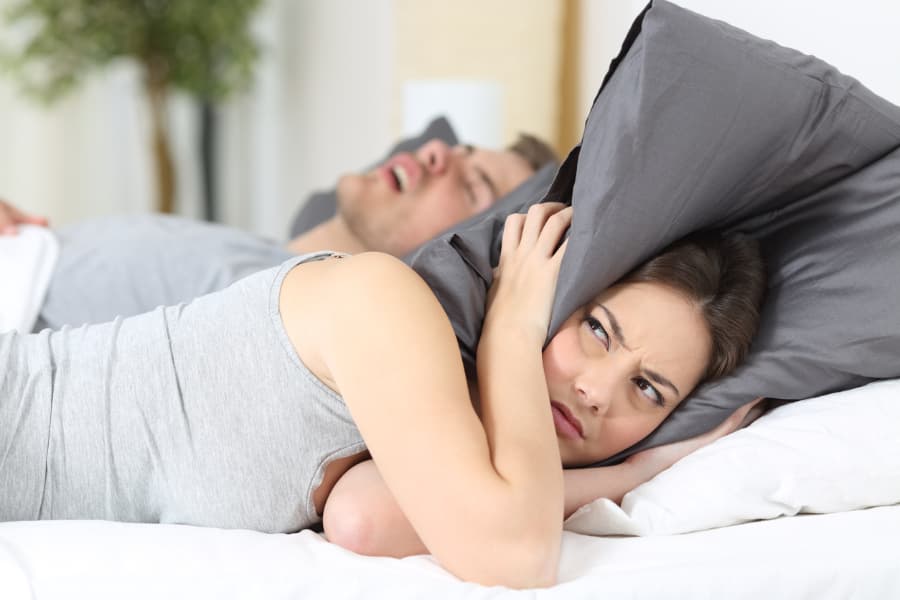Life can be hectic. Between work, exercise, spending time with family, and enjoying hobbies, days can be exhausting. This makes it so important to get a good night’s sleep. Unfortunately, sleep may not come as easy for those who snore or sleep near those who snore. Snoring can keep loved ones awake or wake the snorer from a deep sleep, causing nights to be long and tiring.
At Richmond University Medical Center in Staten Island, New York, our team of medical professionals can help patients manage snoring and other sleep disorders. Here, we explore some simple remedies individuals who snore can try.
How to Stop Snoring Immediately
Patients who have had enough of restless nights and are interested in at-home solutions are in luck. Many physicians will first recommend the following tips to stop snoring before asking patients to consider more specific treatment options:
Pursue a More Balanced Weight
Many do not realize that weight can have a big impact on snoring. Those who are overweight tend to have extra tissues in the throat, which can result in snoring during sleep.
Sleep on Your Side
Many people who suffer from snoring sleep on their backs. This means that their tongue may fall back into their throat as they sleep, which can obstruct the flow of air as they breathe. Sleeping on the side helps eliminate this problem.
Get Adequate Sleep
Sleep deprivation is a major cause of snoring. Individuals should strive to get the recommended hours of sleep each night, which averages out to about seven hours. Some people may require more sleep to feel rested.
Avoid Drinking and Smoking
Drinking alcohol or taking sedatives near bedtime can depress the central nervous system. This can result in the tissues in the throat relaxing, leading to snoring. On the other hand, smoking can affect one’s breathing in general, and quitting may reduce the risk of snoring.
Use Nasal Strips
Nasal strips can be purchased at a local pharmacy and are designed to relieve nasal congestion and help improve sleep. These adhesive strips help to increase the area of the nasal passage to make it easier to breathe throughout the night.
Prop Up the Head of the Bed
Elevating the head of the bed will adjust one’s sleeping position. This is an ideal option for patients who struggle to sleep on their side as it helps to open up their airways during sleep.
More Involved Remedies
While the preceding solutions are often quick and inexpensive, many people will not experience relief from these simple methods. Patients who still snore after attempting these remedies should consult with their physicians for more assistance. A medical professional will have the expertise and resources to offer the following solutions:
Sleep Studies
There are several types of sleep tests that physicians may look to perform to best identify the root cause and the simplest solution. From routine polysomnography to a maintenance of wakefulness test (MWT), medical professionals who deal with sleep disorders know how to provide further insight into the problem.
Oral Appliances
These form-fitting mouthpieces are designed to advance the position of the patient’s jaw, soft palate, and tongue. This helps open up one’s air passage. A dental specialist will customize the fit, and patients may also see a sleep specialist who will ensure it is working properly.
Continuous Positive Airway Pressure (CPAP)
A CPAP machine features a mask that the patient wears over their nose or mouth and a pump that utilizes pressurized air to keep the airway open as they sleep. This device will prevent snoring but can be difficult for patients to get used to wearing at night.
Get a Better Night’s Sleep with Help from Richmond University Medical Center
There are plenty of basic at-home solutions to try for those seeking a way to stop snoring, but if these do not work, patients should look to medical professionals like those at Richmond University Medical Center in Staten Island, New York. Our team treats snoring, sleep apnea, and more at the Sleep Disorders Institute, which allows patients to get the rest they need to take on the day. Contact us today to get more information on sleep disorders, sleep studies, and how to stop snoring.




